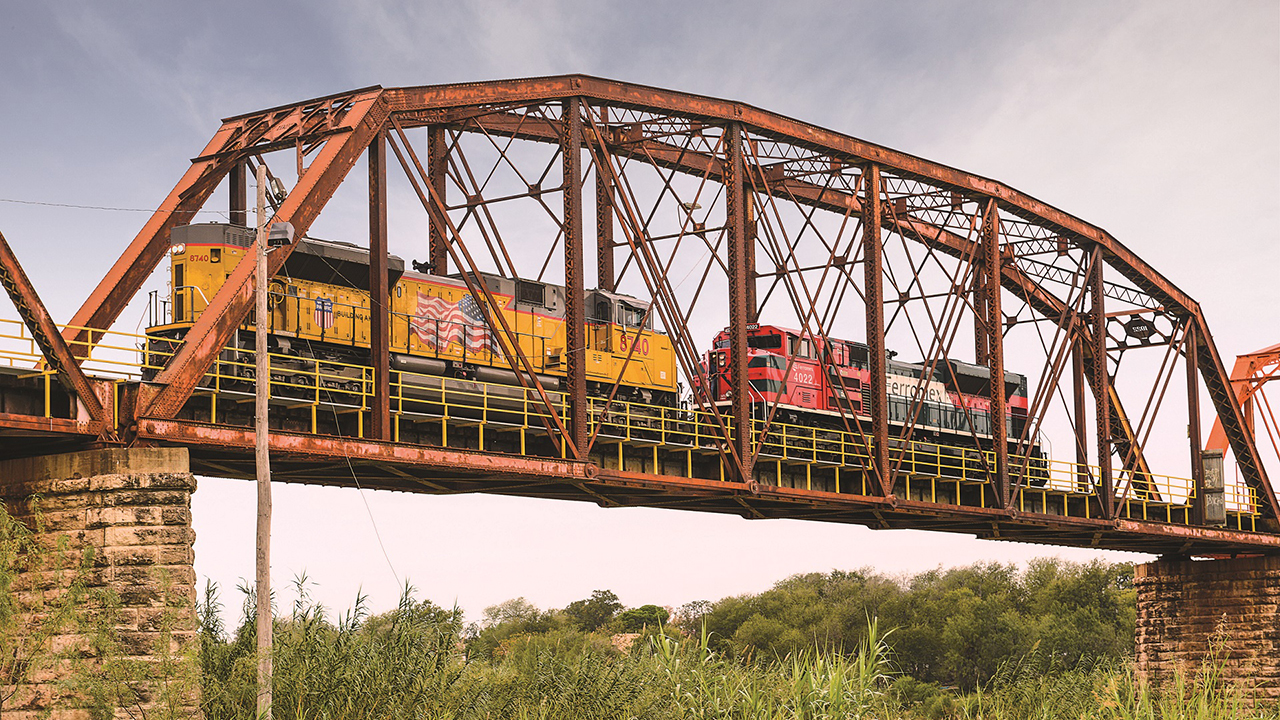
USCPB Border Blockage Still Suffocating Railroads (Updated Dec. 22)
Written by William C. Vantuono, Editor-in-Chief
In 2012, Union Pacific and Ferromex locomotives meet on the international bridge at Eagle Pass, Texas, during a staged photo shoot.
Dec. 22 marks five days since U.S. Customs and Border Protection (CBP) halted Union Pacific, BNSF and Ferromex rail operations at the U.S/Mexico border crossings at El Paso and Eagle Pass. CPB, the Association of American Railroads has repeatedly said since Dec. 20, “has offered no guidance on when operations will be restored at these key arteries for the North American rail network.” AAR President and CEO Ian Jefferies told MSNBC on Dec. 21 that CPB is “holding trains hostage” at the border.
“Each day, BNSF and Union Pacific railroad securely operate 24 trains across these two crossings, moving agricultural products, automotive parts, finished vehicles, chemicals, consumer goods and more to customers on both sides of the border,” AAR said. “These closures mean businesses spanning the continent will see delayed or even canceled shipments.”
According to Bureau of Transportation Statistics data, El Paso and Eagle Pass accounted for $33.95 billion or 35.8% of all cross-border rail traffic from November 2022 to October 2023. During that period, about 7.04 million metric tons of product moved via rail to/from Mexico through the crossings. UP is estimating a “staggering” $200 million hit to the North American economy each day its operations at these crossings remain closed. These two locations represent 45% of UP’s cross-border business, and every day they’re closed, UP is forced to embargo roughly 120 trains accounting for almost 10,000 railcars. Add to that the impacts to BNSF’s operations.
“Migrants are not using the rail crossings to enter the country in significant amounts,” AAR stressed. “Widely circulating video is not from these direct crossings. Railroads in partnership with CBP ensure that 100% of trains are screened and any unauthorized individuals are apprehended. Closing the rail gateways to move 4 or 5 CBP agents who staff the crossings at any one time to support other efforts related to the current crisis [provides CBP with] limited additional capacity, but results in tremendous economic hardship. With no end in sight, rail customers are calling on the [Biden] Administration to take immediate action and restore the vital trade routes between the two nations.”
“The closure of rail and freight operations at Eagle Pass and El Paso is already impacting ACC member companies,” said the American Chemistry Council. “Railcars have been embargoed and companies are unable to ship products to customers in Mexico. As of Dec. 19, one ACC member alone had 45 loaded cars stuck waiting to move into Mexico and 62 empty cars waiting to return. These closures are likely to create wider backups, with implications for the entire U.S. railroad network. The fact that CBP previously closed the border only a few short months ago gives us greater concern that these measures will be part of an increasing trend.”
“While acknowledging the ongoing border issues, it is imperative that the flow of freight remains unencumbered throughout these challenges,” said Intermodal Association of North America President and CEO Joni Casey. “Reopening of these border crossings is vital to reinstating the essential flow of trade between the U.S. and Mexico.”
”Shutting down rail traffic through Eagle Pass and El Paso will inflict significant economic harm,” said U.S. Chamber of Commerce Chief Policy Officer Neil Bradley. “Halting the legal movement of commerce will do nothing to secure the border.”
In a letter sent Dec. 20 to Homeland Security Secretary Alejandro Mayorkas, the National Grain and Feed Association (NGFA) and 45 other members of the Agricultural Transportation Working Group requested the immediate opening of the rail crossings.
“The closure of the rail crossings is rippling back into the U.S. supply chain and having negative impacts on the U.S. economy,” the letter notes. “While we are sympathetic to the humanitarian needs on the U.S./Mexico border, the interconnectedness of the North American supply chain means the closure of rail crossings causes backups on the rail system as far north as the U.S./Canada border and hurts our economy.”
“Nearly two-thirds of all U.S. agricultural exports to Mexico move via rail,” the groups noted in the letter. “Mexico was the United States’ second largest export market in 2022 with $28.5 billion in sales. Each day the crossings are closed, nearly 1 million bushels of grain exports are potentially lost along with export potential for many other agricultural products.
”Due to the closures, rail carriers need to idle trains or reroute them in illogical ways, adding friction within the supply chain. We are aware of grain trains sitting at origin in at least six states that are unable to move, and we expect this number to grow. We have also heard of customers in Mexico telling U.S. suppliers they will begin to look to other countries if the U.S. cannot provide a resilient and reliable supply chain.
“Blocking U.S. ag exports to Mexico creates a real threat of food inflation and increased food insecurity in that country. Mexico’s livestock and poultry industry is already running low on feed, and Mexican livestock and poultry producers may need to [kill] animals for humanitarian reasons if these shipments continue to be blocked. It is hard to understand how CBP would allow this to happen to the food chain of our neighbor and one of our closest trading partners. We understand there is a migrant crisis, but a supply chain and potential food security crisis in Mexico can be avoided by reopening the international crossings.”
Editor’s Commentary: Enough is enough. The rail industry—surprise, surprise!—is being punished for a humanitarian crisis it neither created, is contributing to or can fix. While migrants are in fact riding FXE freight trains (and in plain sight, risking serious injury and death) to get close to the border, they’re leaving those trains and attempting to cross on foot. Even if the Mexican government were to make a serious effort to help FXE keep them off the trains for their own safety, these desperate people, who are trying to escape from poverty and political/military oppression in their native countries for a better life in the United States—a nation created and sustained by immigrants and their descendants, not “poisoned by their blood”—will find another way to move north. If the U.S. government wants to utilize our industry’s substantial talent and resources to help solve this crisis and assist these people, it needs to stop disrupting our business, immediately.
Why hasn’t the STB, given its concern over rail service failures, weighed in through the STB Chairperson to explain the economic crisis the rail border crossing closures have imposed? Why hasn’t the DOT Secretary done the same? National TV news reports show video of thousands of migrants in temporary outdoor holding facilities or cutting their way through razor wire at El Paso—with an empty UP bridge in the background. No mention of rail (or truck) stoppages at all. Meanwhile, SECDOT Pete smiles for the cameras, talking about how airline delays for holiday travelers are 50% lower than 2002. Go figure. – William C. Vantuono
This disruption affects train crews and other essential railroad field personnel whose livelihood depends on trains moving. Rail labor leadership, which it is closely aligned with the Biden Administration, finally spoke up. Greg Regan and Shari Semelsberger, President and Secretary-Treasurer of the Transportation Trades Department, AFL-CIO (TTD), on Dec. 22 issued the following statement: “As the nation’s largest transportation federation, we are proud to represent thousands of workers who move critical freight into and around the country, and who keep our economy moving. At the same time, we recognize that the humanitarian and security crisis on the southern border necessitated the operational decision to shut down two critical freight rail border crossings. Extended closure of these crossings will impact the entire freight rail network and supply chain. We cannot compound the current problem and risk an economic crisis. Transportation labor urges the Department of Homeland Security and Customs and Border Protection to reopen the Eagle Pass and El Paso rail crossings in Texas, and allow freight trains to resume service in a safe and secure manner.”



